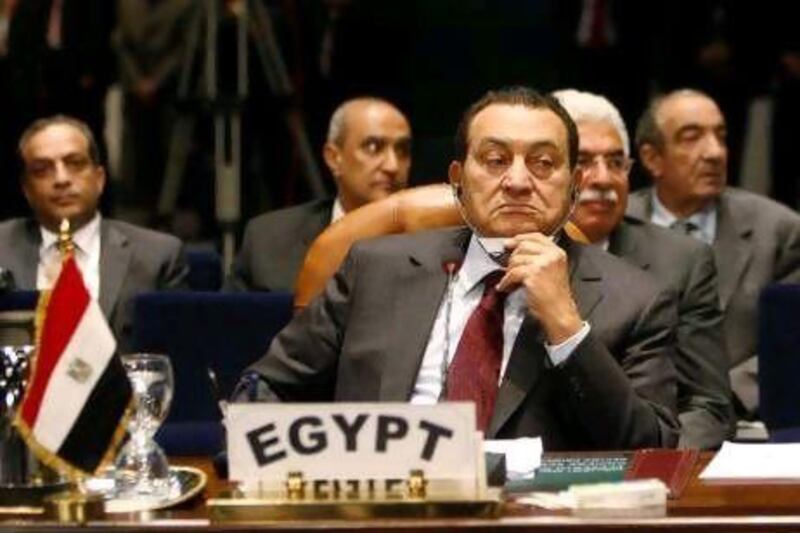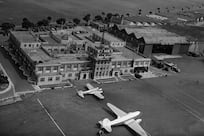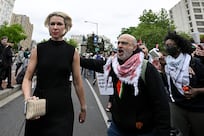With the verdict due in his trial tomorrow, those who knew him assess his reign. Some say history will judge him more kindly than the people who forced him out.
ALEXANDRIA // One wall of Sherif Riad's office is covered with pictures of him standing in the background of historic meetings and portraits of dignitaries on state visits to Egypt.
There are several of Hillary Clinton, a photo of Mr Riad shaking hands with Muammar Qaddafi on a visit to Egypt and one of Yasser Arafat with a handwritten message.
But lying facedown on his desk are two pictures he does not readily advertise: a photograph of him during a meeting between Hosni Mubarak and then prime minister Atef Ebeid and another of him with the former first lady, Suzanne Mubarak.
Mr Riad, now an executive at the Library of Alexandria, was the chamberlain of the presidential palace and acting chief of protocol from 1998 to 2001. It was a job that gave him a rare window into the lives of the Mubarak family, who lorded over Egypt for 29 years until last year's uprising forced Mubarak to resign and the family to flee to Sharm El Sheikh.
"Despite what people say, there was a period when Mubarak was a great leader," he said.
Mr Riad saw Mubarak as a simple man without a clear vision for Egypt, but also as a polite, kind employer who always took time to ask about the personal lives of his staff and a leader who sometimes surprised his aides with moments of deft politicking.
That portrayal is a striking contrast with the verdict of the streets, where protesters have called for Mubarak's execution and spray-painted ghoulish caricatures of his face on walls around Tahrir Square and other public spaces in Egypt. Many Egyptians have called him one of the worst dictators in the country's long history of colonial occupation, military rulers and pharaohs.
Sixteen months after the 18-day uprising, the debate about who Mubarak really was and what effect his presidency had on Egypt is only just beginning. Several new books have been published, shedding light on the final days in the presidential palace and some of the Egyptians who knew Mubarak are starting to tell their side of the story.
An important moment in the debate over Mubarak may come tomorrow, when a panel of three judges is scheduled to announce whether it has found Mubarak guilty of any or all of the three crimes he has been charged with. Two have to do with allegations of corruption, while the third is about whether he had a role in the killing of protesters between January 25-31 last year. He faces anywhere from three years in prison to the death sentence.
The other defendants in the combined case are his sons, Alaa and Gamal; Hussein Salem, a business tycoon with ties to the former president; as well as the former interior minister Habib El Adly and six of his top-ranking aides. Not all of the defendants are charged with the same crimes. All have denied the charges.
The trial of Mubarak is itself a revolutionary event in the region. He is the first leader of a country swept by the Arab Spring protests to be tried in person for crimes against the country.
Zine El Abidine Ben Ali, who fled to Saudi Arabia during Tunisia's uprising, was convicted in absentia and sentenced to 35 years in prison. In Libya, Muammar Qaddafi was killed by revolutionary fighters in Sirte after emerging from a drainpipe and his body was displayed in the nearby city of Misurata as a trophy.
Yemen's Ali Abdullah Saleh struck a deal to handover power to his vice president and travel to the US for medical treatment in exchange for immunity from prosecution.
The images of Mubarak being wheeled on a guerney into a police academy building that had been converted into a courtroom last August ricocheted around the world. But dressed in white and flanked by his sons, who carried copies of the Quran, he gave little insight into his feelings about the demise of his reign over Egypt. He gave the impression of a sick, old man who had been thoroughly defeated.
Only one thing is certain: he chose to stay in his homeland to face the charges and proclaim his innocence. Several countries offered exile during the initial 18 days of protests, but he refused to leave.
That fact has given rise to a feeling among many who worked for Mubarak, or who were a part of his government, that a third verdict is on the horizon: that of history.
Abdel Moneim Said, a former member of the now disbanded National Democratic Party (NDP) who said he was "purged" from his job as the chairman of the state-run Al Ahram newspaper for his connections to the old regime, believes that history will be kinder to Mubarak than the streets.
"His biggest crime was that he didn't leave power sooner," said Mr Said, who is now the director of the Al Ahram Centre for Political and Strategic Studies. "His problem was that he was the last president of an entire system established by the 1952 revolution that had no mechanism for transferring power democratically … He lacked imagination and ambition. He did a lot for the country, but failed completely politically."
Mr Said said he was among the reformers in the NDP pushing for democratic changes, but their views were stifled by conservative elements who wanted to preserve a system that afforded them great power in Egypt. Many of those conservatives in the party were businessmen who found ways to profit from their political roles, he said.
The opportunities for ensuring a positive legacy were repeatedly missed and the few changes that did come were implemented too late, Mr Said said. Meanwhile, the signs were pointing to some kind of showdown between the regime and the growing number of unemployed youth, opposition activists and ordinary Egyptians who were frustrated with the repression of political rights and the spread of corruption.
Two books about Mubarak's final days as president portray him as a leader with near absolute power who was deeply disconnected from the reality of Egypt and the situation unfolding by the hour in those final days.
Abdel Latif El Mennawy, the former head of the Egyptian News Centre that administered state-owned television channels, describes in Tahrir: The last 18 days of Mubarak how Mubarak repeatedly delayed announcing reforms and guarantees about transfer of power until it was too late.
El Mennawy's book is largely an attempt to paint himself in a positive light as a reformer of state media whose ideas were refused by higher powers, but it reveals details of how reticent Mubarak's top advisers were about giving their frank assessments of the political upheaval during the uprising.
He also describes how the army broke away from the palace as the protests intensified and ultimately pressured Mubarak to abdicate.
In The Rise and Fall … from the Throne to the Trial, the journalist Salah Montasser describes Mubarak as a president who was shielded from the world by his closest advisers: Zakariah Azmi, his long-time chief of staff; Safwat El Sherif, who was secretary general of the National Democratic Party; Fathi Sorour, the speaker of the People's Assembly; his wife and son Gamal. Mr El Sherif and Mr Sorour stepped down from their positions in the final days of the protests.
But the most potent scene Montasser describes is at the opening of the book. After receiving a call from then president Anwar Sadat about his appointment as vice-president, Mubarak betrayed a lack of self-confidence that Montasser argues would later be used by others to direct his near absolute powers to their benefit. Mubarak went on to become the president after Sadat was assassinated by Islamic extremists in 1981.
"He came back concerned, and told his closest friends that he doesn't understand politics and is afraid others will crush him," Montasser writes of Mubarak's appointment as vice-president. "But nobody crushed him, as he expected. He rose until he found himself sitting at the very top as the president of Egypt for an unprecedented length of time."
Abdel Moneim Emara, who served as Mubarak's minister of youth and sports in the 1990s and as a governor of Ismailia during the presidencies of Mubarak and Sadat, described Mubarak in the terms of a small village with an ageing leader.
"We have situations like this across Egypt: imagine an old mayor, wearing a cloak and sitting on his throne with a wooden staff," he said. "Advisors come and say 'what shall we do about this problem?' and he says back to them, 'Do what you think is good. I'm an old man.'"
Mr Emara said the problem of his leadership was the "filtration" of information and advice that made it to the inner sanctum of the palace. In the beginning it was men like Azmi, who was sentenced this week to seven years in prison and fined US$6 million (Dh22m) for corruption, who prevented an accurate picture from forming in his mind about what needed to be done.
In the final years, his wife Suzanne began pushing him to help his son Gamal become president even as many were against a succession plan, Mr Emara said.
"As a human I liked him, but as president I am against him," he said. "He was not intelligent, but he would be considered a good president if he left by 1999."
Mr Riad said he shared that sentiment.
"Until the end of the 1980s or even into the 1990s, he was very ambitious and a hard worker. If he had left then, history would remember him very differently," he said.
bhope@thenational.ae
Follow
The National
on
[ @TheNationalUAE ]
& Bradley Hope on
[ @bradleyhope ]





